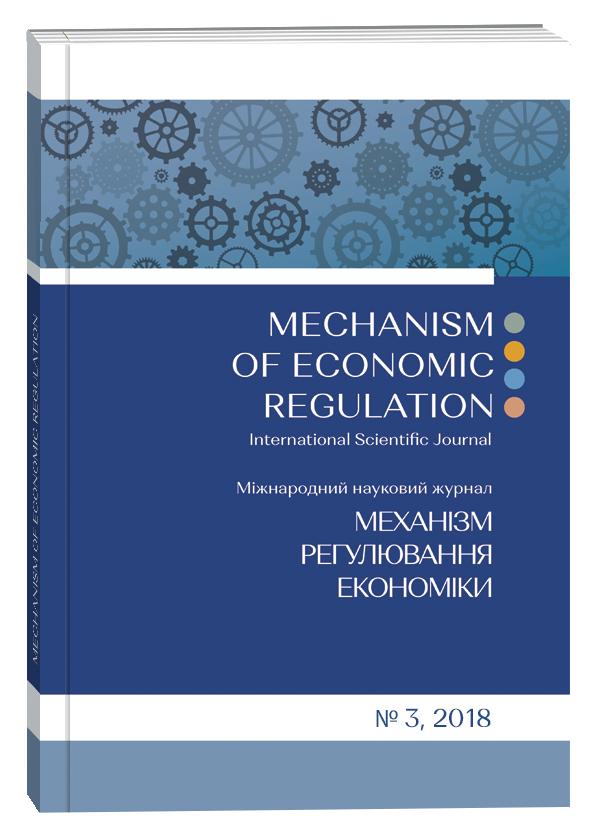ФОРМУВАННЯ НОВОГО ТУРИСТИЧНОГО ПРОДУКТУ: СИНЕРГЕТИЧНІ МОЖЛИВОСТІ БІЗНЕС-СЕРЕДОВИЩА
Анотація
Бізнес-середовище – це система, яка має власну структуру і, відповідно, володіє синергією, тобто здатністю самоорганізації. Самоорганізація – унікальне явище у відкритих системах, яке вивчається відносно новою наукою синергетика. Інструменти, які вона пропонує, в економіці широко не використовуються. Розуміння будь-якої економіки як системи з певним рівнем синергії - це основа для розвитку нових видів економічної політики, особливо на регіональних рівнях у контексті прийняття центральними органами влади неефективних рішень у сфері розвитку. У даній роботі вивчаються конкретні синергетичні можливості бізнес-середовища, які стосуються формування нових туристичних продуктів. Унікальність кожної туристичної дестинації підкреслює важливість участі регіонів і територіальних громад в її популяризації. Дане дослідження докладно описує синергетичні можливості бізнес-середовища на регіональному рівні, які можуть бути використані для створення абсолютно нових туристичних дестинацій. Виявлено важливість інформаційних потоків. Організаційні процеси розподілу інформації пропонуються нами у якості основного принципу ефективного використання синергетичних можливостей навколишньої системи при виведенні на ринок нових екологічних продуктів (конкретних івентів і загалом дестинацій) в туристичному контексті. Умови, у яких можливі вищезгадані процеси, вивчаються на прикладі Херсонської області та процесі організації конкретного фестивалю на півдні України в 2017 році – Міжнародного фестивалю повітряних зміїв Tryhutty. Херсонська область та Україна взагалі володіють величезним туристичним потенціалом, який досі не реалізований. Таким чином, розробка нових інструментів для створення нових туристичних продуктів є актуальною. Деякі підходи до використання синергії в туризмі пропонуються на основі українського та індійського досвіду.
Посилання
Melnik, L. H. (2013). Ekonomika razvitiya [Development economics]. Sumy: Universitetskaya kniga, 784.
Pazenok, V. S., Fedorchenko, V. K., Kruchek, O. A., Dorova, T. A., Liubitseva, O. O. (2013). Turyzmolohiia: kontseptualni zasady teorii turyzmu [Tourismology: conceptual basis of the theory of tourism]. Kyiv: Akademiia, 368.
Matviichuk, Yu. (2013). Ekonomika rozvytku: shho ce oznachaje dlia Ukrainy? [Development economics: what does this mean for Ukraine?]. Visnyk Natsbanku Ukrainy: naukovo-praktychnyj zhurnal, 5(207), 36–39.
Pryimak, V. I., Hynda, S. M. (2016). Rol ta funkcii kapitalizacii u zabezpechenni rozvytku ekonomiky Ukrainy [The role and functions of capitalization in ensuring the development of the Ukrainian economy]. Regionalna ekonomika ta upravlinnia, 2(09), 35–39.
Novikova, N. O. (2015). Instytuty ta ih rol v rozvytku ekonomiky [Institutes and their role in economic development]. Molodyj vchenyj, 10(25), 59–63.
Melnyk, L. H., Sotnyk, I. M., Chyhryn, O. Yu. (2010). Ekonomika pryrodnyh resursiv: navch. posib. [Economics of natural resources]. Sumy: Universytetska knyha, 348.
Melnyk, L. H. (2006). Ekolohichna ekonomika [Ecological economy]. Sumy: Universytetska knyha, 367.
Melnyk, L. H., Karintseva, O. (2005). Osnovy stiikoho rozvytku: Praktykum [Basics of Sustainable Development: Practicum]. Sumy: Universytetska knyha, 352.
Ivaschenko, M. V. (2012). Ekonomichna povedinka yak chynnyk instytucionalnyh peretvoren: monografiya [Economic behavior as a factor of institutional transformation: monograph]. Kyiv, UBS NBU, 211.
Smoliy, V., Fedorchenko, V., Tsybuh, V. (2006). Encyklopedychnyj slovnyk-dovidnyk z turyzmu [Encyclopedic Dictionary in Tourism]. Kyiv, Vyd. dim “Slovo”.
Haken, G. (1989). Sinergetika [Synergetics]. Moskva: Mir, 419.
Bevzenko, L. D. (2002). Sotsial’naya samoorganizatsiya [Social self-organization]. Kyiv: Institut sotsiologii NAN Ukrainy, 437.
Sharko, M. V., Obolentseva, E. A. (2008). Primenenie sinergeticheskikh predstavleniy k prognozirovaniyu rezul’tatov innovatsionnoy deyatel’nosti [Application of synergistic views to forecasting the results of innovation activities]. Rуnkova ekonomіka: suchasna teorіya і praktika upravlіnnya, 11(19), 155–162.
Sharko, M. V., Koposov, G. A. (2008). Ispol’zovanie sinergeticheskogo effekta pri formirovanii strategii razvitiya proizvodstva [Use of synergetic effect in the formation of the strategy of production development]. Proceedings of the Suchasnі tekhnologії menedzhmentu: problemi teorії ta praktiki (October 23–24). Kharkіv: Kharkіvs’kiy natsіonal’niy ekonomіchniy unіversitet, 19, 98–101.
Pidvalna, O. H., Koziar, N. O. (2013). Synerhiinyi efekt v menedzhmenti [Synergistic effect in management]. Efektyvna ekonomika (electronic journal), 3. Retrieved from http://www.economy.nayka.com.ua/?op=1&z=1865.
Chmut, A. V. (2010). Synerhichnyi efekt yak faktor pidvyshchennia konkurentospromozhnosti intehrovanykh pidpryiemstv [Synergetic effect as a factor in increasing the competitiveness of integrated enterprises]. Visnyk Kharkivskoho natsionalnoho tekhnichnoho universytetu silskoho hospodarstva. Seriia «Ekonomichni nauky», 97, 388.
Melnyk, L. H., Dehtiarova, I. (2010). Synerhetychna osnova marketynhovyh innovaciy [Synergistic basis of marketing innovations]. Marketynh i menedzhment innovaciy, 1, 67–77. Retrieved from http://mmi.fem.sumdu.edu.ua/sites/default/files/mmi2010_1_67_77.pdf.
Musaev, L. A. (2011). Otsenka sinergeticheskogo effekta ekonomicheskikh sistem [Evaluation of the synergistic effect of economic systems]. Vestnik YuRGTU (NPI) (electronic journal), 3, 132–136. Retrieved from http://vestnik- npi.info/upload/information_system_15/3/5/7/item_357/information_items_property_743.pdf.
Novikov, V. A., Vankovich, G. R., Suares, L. I. (2012). Metodika opredelenija rejtinga vnutrennego sinergizma kollektivnoj sistemy [Methodology for determining the rating of the internal synergy of a collective system]. Ekonomika i upravlenie (electronic journal), 2, 51–54. Retrieved from http://media.miu.by/files/store/items/eiup/30/eiu_30_2012_7.pdf.
Skitsko, V. I. (2015). Analiz ta modeliuvannia synerhichnoho efektu lohistychnykh system mikroekonomichnoho rivnia [Analysis and simulation of the synergistic effect of logistic systems of microeconomic level]. Problemy ekonomiky, 1, 242–248.
Knjazeva, E. N., Kurdjumov, S. P. (2007). Sinergetika: Nelinejnost vremeni i landshafty kojevoljucii [Synergetics: Nonlinearity of time and landscapes of coevolution]. Moskva.
Zayceva, O. I. (2014). Doslidzhennja ta identyfikacija vlastyvostej i zdibnostej pidpryjemstv do samoorganizacii' v konteksti transformacii' koncepcij upravlinnja [Investigation and identification of the properties and abilities of enterprises to self-organization in the context of transformation of management concepts]. Visnyk Hmel'nyc'kogo nacional'nogo universytetu, 3, 100–103.
Shevtsova, H. Z. (2012). Synerhetychnyi menedzhment yak kontseptsiia orhanizovanoi synerhii v upravlinni pidpryiemstvamy [Synergetic management as a concept of organized synergy in the management of enterprises]. Ekonomika promyslovosti (electronic journal), 1–2, 202–214. Retrieved from http://dspace.nbuv.gov.ua/handle/123456789/41438.
Hodakivskijy, Ye., Kaminska, V., Mosiyenko, O. (2011). Synerhetychni pidhody do formuvannia intehratsiynyh struktur [Synergetic approaches to the formation of integration structures]. Ekonomika APK (electronic journal), 1, 121–126. Retrieved from http://eapk.org.ua/sites/default/files/eapk/2011/2011_01/11_01_21.pdf.
Prigozhin, I., Stengers, I. (1986). Poryadok iz khaosa: Novyy dialog cheloveka s prirodoy [Order Out of Chaos: Man’s New Dialogue with Nature]. Moskva: Progress, 431.


